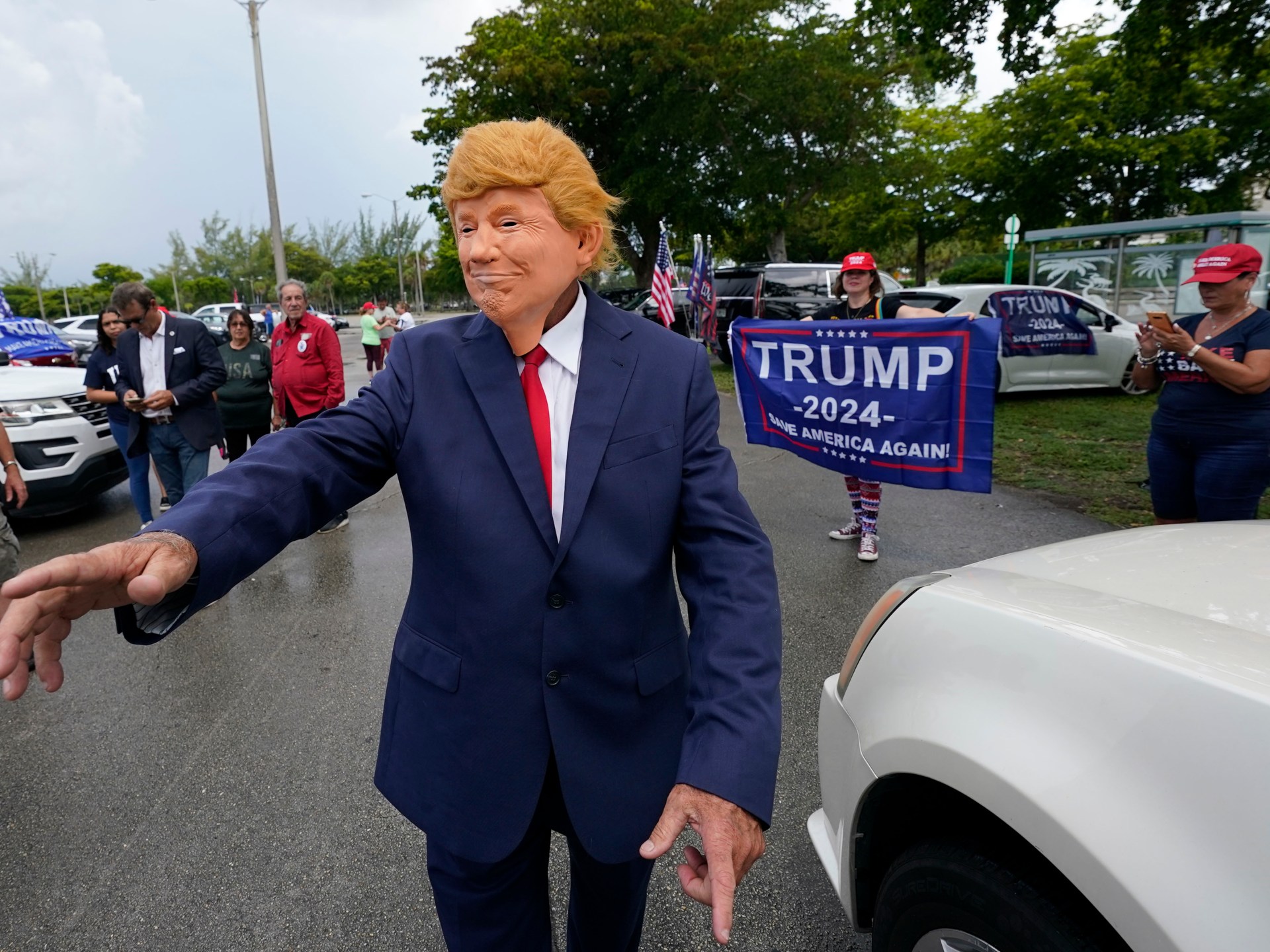Five things to expect from Trump’s appearance in Florida court
Former United States President Donald Trump is set to appear in federal court in Florida on Tuesday, days after being indicted on 37 charges related to allegedly keeping and hiding classified documents he took when he left the White House.
Prosecutors have said those documents contained sensitive information that could put at risk national security, undermine foreign relations and endanger human assets, the indictment explains. They further said Trump and his team stored the documents sloppily across his Mar-a-Lago estate in Palm Beach, Florida – then, along with his aide, Waltine “Walt” Nauta, sought to conceal them as the FBI’s investigation heated up.
While many details of Trump’s first appearance in the case are expected to be similar to his appearance in a New York state court in April on separate criminal charges related to hush-money payments made to a porn star, there are expected to be some key differences.
Here’s what we know so far:
1. The venue
The case is being tried in the US District Court in Miami, Florida, even though a grand jury had initially been convened in Washington, DC. A separate, Florida-based grand jury led to Thursday’s indictment.
While prosecutors have not spoken publicly about why they pursued the venue, court watchers have noted it may have been to head off a possible attempt by the Trump team to have the venue moved. Trump’s legal team in New York had earlier argued that he could not receive a fair trial in liberal Manhattan in that case.
While it is unclear if Trump would have been successful in moving the case from the liberal-leaning US capital, the expected challenge would have likely delayed the proceedings.
Trump has much wider support in Florida, where Mar-a-Lago is located, winning the state with more than 51 percent of the vote in the 2020 presidential election.
The venue also has resulted in Trump’s own appointee being assigned to the case. Florida Federal Judge Aileen Cannon was previously thrust into the spotlight last year when she issued a decision to appoint a “special master” in the classified documents probe.
Cannon also briefly barred federal agents and prosecutors from reviewing a batch of seized documents from Mar-a-Lago, an order that was ultimately thrown out in a scathing opinion by a federal appeals court. Trump supporters have cheered her assignment.
2. What will security be like?
Much like in New York, local and federal law enforcement are preparing for the fallout of Trump’s appearance.
The former president said he was summoned to be at court at 3pm (19:00 GMT) Tuesday.
The Secret Service has said it is finalising a plan for Tuesday, but added it “will not seek any special accommodations outside of what would be required to ensure the former President’s continued safety”.
The federal US Marshals Service, the FBI, and Miami and county police are all expected to coordinate in preparation for any unrest, with the Washington Post reporting that authorities were monitoring online forums, including plans by the far-right Proud Boys group to protest at the court.
Miami Police Chief Manny Morales said resources were being surged to handle anywhere 5,000 to 50,000 people.
“We don’t expect any issues,” he said.
3. Will there be protests?
Trump, in an interview with conservative consultant Roger Stone, said after the unsealing of the indictment: “Our country has to protest.”
On Monday Trump arrived in Florida, traveling from his home in Bedminster, New Jersey to his resort in Doral, Florida, where rallies were expected. He has said he will return to New Jersey to deliver a speech to supporters after the proceedings.
Staunch Trump defender and failed Arizona gubernatorial candidate Kari Lake has also said she will travel to Florida for the court appearance. She has been accused of stoking violence, telling a crowd of Georgia Republicans on Friday: “If you want to get to President Trump, you’re going to have to go through me, and you’re going to have to go through 75 million Americans just like me.”
“And I’m going to tell you, most of us are card-carrying members of the NRA [National Rifle Association]. That’s not a threat – that’s a public service announcement.”
While concerns about violence preceded Trump’s New York court appearance in April, the accompanying protests were mostly peaceful.
4. Will Trump be cuffed?
Many of the questions that surrounded Trump’s court appearance in New York have swirled around his latest date with the justice system.
While defendants who voluntarily appear in court after being indicted are typically handcuffed, fingerprinted and photographed upon their arrival, authorities only fingerprinted Trump when he arrived in the Manhattan criminal court in May.
What will be markedly different is Trump’s visibility during the proceedings. He is expected to enter the court via an underground tunnel, away from public view. With cameras typically not allowed in federal courthouses, viewers are unlikely to see Trump in the courthouse.
5. Will Trump plea?
It remains unclear whether Trump will enter a plea in response to the 37 charges during the proceedings on Tuesday.
Still, reporting from Miami, Al Jazeera’s Alan Fisher said an array of possible arguments are likely to emerge from Trump’s legal team on Tuesday.
“We’re expecting his team to suggest the charges should immediately be thrown out. They will talk about selective prosecution,” Fisher said. “There may well be an argument to move this to West Palm Beach down near Mar a Lago, claiming that that’s where the offenses allegedly took place – therefore that’s where the hearing and the court hearing and the trial should take place if it actually goes to trial.”




